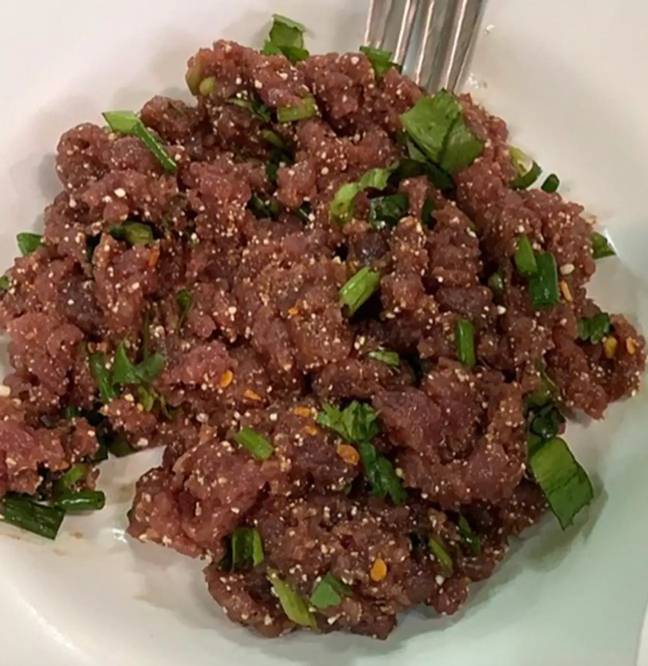.png)
Topics: Cancer, Health, Science, Thailand, Food and Drink, World News
To make sure you never miss out on your favourite NEW stories, we're happy to send you some reminders
Click 'OK' then 'Allow' to enable notifications
.png)
Topics: Cancer, Health, Science, Thailand, Food and Drink, World News
Warning: This article contains discussion of cancer which some readers may find distressing.
If you were warned that a meal might kill you, you'd probably avoid it, wouldn't you?
Well, apparently, not everyone would as a doctor in Thailand explained that he frequently tells his patients to not eat one dish in particular and a lot of them have a bizarre response to their doc's instructions.
Advert

Doctor Narong Khuntikeo is fighting against the delicacy, known as koi pla, after he tragically lost both of his parents to liver cancer after they ate it - while a report also suggests that around 20,000 people in the Southeast Asian country also suffer a similar fate.
The dish is particularly popular in one of the nation’s poorest provinces, Isaan, who have have the highest reported number of cases.
Millions of Thai people consume it on a regular basis and you'd imagine it's the type of fish that is the issue, well, it's partly the issue but only in one part of the country.
Advert
Locals are reportedly sourcing the fish from a water location in the Mekong region, which contains parasitic flatworms - or live flukes - which are consumed by the fish.
These flatworms contain bile duct cancer and that's why Isaan has the highest reported instance of cholangiocarcinoma.
"It’s a very big health burden around here," the liver surgeon Khuntikeo told Agence France-Presse.

Advert
"But nobody knows about this because they die quietly, like leaves falling from a tree."
He has joined up with a team of doctors, anthropologists and scientists, who have spent four years testing villagers from the Isaan region for the parasite.
But it is while he's been trying to spread information warning people not to dine on the dish in the area, Khuntikeo has said he's faced issues with the older generation.
Incredibly, when speaking to the elderly, some of them give him a bizarre reason why they weren't going to stop eating the dish.
Advert
"They’ll say: 'Oh well, there are many ways to die,'" the health professional said.
"But I cannot accept this answer."

Through using ultrasound machines and urine testing kits, the doctor found that as much as 80 per cent of inhabitants from some communities were found to have ingested the deadly parasite.
Advert
He has worked alongside local health officials to introduce a school curriculum geared at teaching children about the risks of raw foods.
But there are people who will continue to eat it, including one farmer from the Khon Kaen province, Boonliang Konghakot, does not have an issue with it, and said: "I used to come here and just catch the fish in the pond...it’s so easy to eat raw."
While Thanin Wongseeda, another villager who was being screened as part of Khuntikeo's initiative, revealed: "I’ve never been checked before, so I think I will probably have it because I’ve been eating (koi pla) since I was little."
If you’ve been affected by any of these issues and want to speak to someone in confidence, contact the American Cancer Society on 1-800-227-2345 or via their live chat feature, available 24/7 every day of the year.